
The partition of India in 1947 was the division of British India into two independent dominion states, the Union of India and Dominion of Pakistan. The Union of India is today the Republic of India and the Dominion of Pakistan, the Islamic Republic of Pakistan and the People's Republic of Bangladesh. The partition involved the division of two provinces, Bengal and the Punjab, based on district-wise Hindu or Muslim majorities. It also involved the division of the British Indian Army, the Royal Indian Navy, the Indian Civil Service, the railways, and the central treasury, between the two new dominions. The partition was set forth in the Indian Independence Act 1947 and resulted in the dissolution of the British Raj, or Crown rule in India. The two self-governing countries of India and Pakistan legally came into existence at midnight on 14–15 August 1947.

Sir Khawaja Nazimuddin was a Pakistani politician and statesman who served as the second governor-general of Pakistan from 1948 to 1951, and later as the second prime minister of Pakistan from 1951 to 1953.

Huseyn Shaheed Suhrawardy was a Pakistani Bengali barrister and politician. In Bangladesh, Suhrawardy is remembered as a pioneer of Bengali civil rights movements, later turned into Bangladesh independence movement, and the mentor of Bangladesh's founding leader Sheikh Mujibur Rahman. He is also remembered for his performance as the Minister for Civil Supply during the Bengal famine of 1943. In India, he is seen as a controversial figure; directly responsible for the 1946 Calcutta Killings, for which he is often referred as the "Butcher of Bengal" in West Bengal.

The Pakistan Movement emerged in the early 20th century as part of a campaign that advocated the creation of an Islamic state in parts of what was then British India. It was rooted in the two-nation theory, which asserted that Indian Muslims were fundamentally and irreconcilably distinct from Indian Hindus and would therefore require separate self-determination upon the decolonization of India. The idea was largely realized when the All-India Muslim League ratified the Lahore Resolution on 23 March 1940, calling for the Muslim-majority regions of the Indian subcontinent to be "grouped to constitute independent states" that would be "autonomous and sovereign" with the aim of securing Muslim socio-political interests vis-à-vis the Hindu majority. It was in the aftermath of the Lahore Resolution that, under the aegis of Muhammad Ali Jinnah, the cause of "Pakistan" became widely popular among the Muslims of the Indian independence movement.

Sir Malik Feroz Khan Noon, best known as Feroze Khan, was a Pakistani politician who served as the seventh prime minister of Pakistan from 16 December 1957, until being removed when the President Iskandar Ali Mirza imposed martial law, though he himself got ousted in the 1958 Pakistani military coup.

Sir Malik Khizar Hayat Tiwana was a British Indian statesman, landowner, army officer, and politician belonging to the Punjab Unionist Party. He served as the prime minister of the Punjab Province of British India between 1942 and 1947. He opposed the Partition of India and the ideology of Muslim League. He was eventually ousted from office by the Muslim League through a civil disobedience campaign, plunging Punjab into communal violence that led to the partition of the province between India and Pakistan.
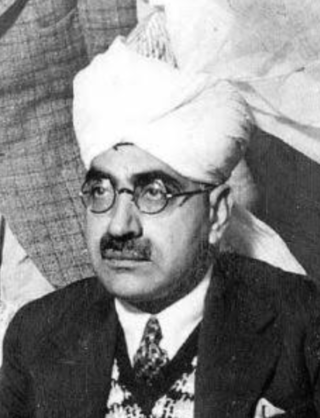
Khan Bahadur Major Sir Sikandar Hayat Khan,, also written Sikandar Hyat-Khan or Sikandar Hyat Khan, was an Indian politician and statesman from the Punjab who served as the Premier of the Punjab, among other positions.
The National Unionist Party was a political party based in the Punjab Province during the period of British rule in India. The Unionist Party mainly represented the interests of the landed gentry and landlords of Punjab, which included Muslims, Hindus and Sikhs. The Unionists dominated the political scene in Punjab from World War I to the independence of India and the creation Pakistan after the partition of the province in 1947. The party's leaders served as Prime Minister of the Punjab. The creed of the Unionist Party emphasized: "Dominion Status and a United Democratic federal constitution for India as a whole".
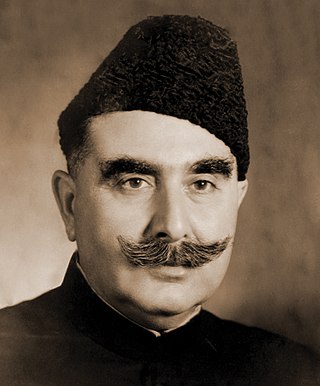
Sardar Abdur Rab Nishtar was a Pakistani independence activist and politician from the North-West Frontier Province. He served as the first Minister of Communications of Pakistan from August 1947 to August 1949 and then as the second Governor of West Punjab from August 1949 to November 1951.
The Krishak Sramik Party was a major anti-feudal political party in the British Indian province of Bengal and later in the Dominion of Pakistan's East Bengal and East Pakistan provinces. It was founded in 1929 as the Nikhil Banga Praja Samiti to represent the interests of tenant farmers in Bengal's landed gentry estates. Sir Abdur Rahim was its first leader. A. K. Fazlul Huq was elected leader in 1935 when the former was appointed as the president of the Central Legislative Assembly of India.

Nawab Mian Mumtaz Daulatana, was a Pakistani politician and a key supporter of Pakistan Movement in British India. After independence, he served as the second Chief Minister of West Punjab in Pakistan.

When the All-India Muslim League was founded at Dacca, on 30 December 1906 at the occasion of the annual All India Muhammadan Educational Conference, It was participated by the Muslim leaders from Punjab, i.e., Sir Mian Muhammad Shafi, Mian Fazl-i-Hussain, Abdul Aziz, Khawaja Yusuf Shah and Sh. Ghulam Sadiq. Earlier Mian Muhammad Shafi organised a Muslim Association in early 1906, but when the All-India Muslim League was formed, he established its powerful branch in the Punjab of which he became the general secretary. Shah Din was elected as its first president. This branch, organised in November 1907, was known as the Punjab Provincial Muslim League.

Provincial elections were held in British India in the winter of 1936–37 as mandated by the Government of India Act 1935. Elections were held in eleven provinces - Madras, Central Provinces, Bihar, Orissa, the United Provinces, the Bombay Presidency, Assam, the North-West Frontier Province, Bengal, Punjab and Sind.

Provincial elections were held in British India in January 1946 to elect members of the legislative councils of the Indian provinces. The Congress, in a repeat of the 1937 elections, won (90%) of the general non-Muslim seats while the Muslim League won the majority of Muslim seats (87%) in the provinces.

Mahmud Ali was a progressive leftist Pakistani politician known for his agrarian politics. He was part of the Freedom Movement and played an important role during the Sylhet referendum which led to its merger with East Bengal. As member of Pakistan's Second Constituent Assembly he demanded the recognition of Bengali as one of the national languages of Pakistan and advocated the cause through his newspaper, the Nao Belal. He strongly opposed the 'One Unit' scheme and voted against the merger in 1956. After the dissolution of the assembly and abrogation of the 1956 Constitution he worked towards the restoration of provinces and a parliamentary form of government based on adult franchise.
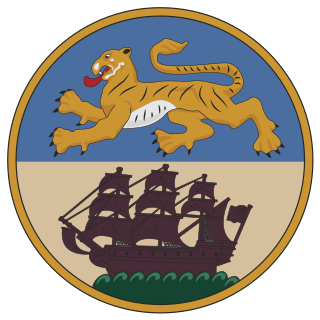
The prime minister of Bengal was the head of government of Bengal Province and the Leader of the House in the Bengal Legislative Assembly in British India. The position was dissolved upon the Partition of Bengal during the partition of India in 1947.
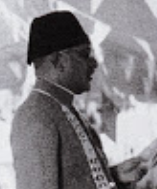
Nawab Iftikhar Hussain Khan of Mamdot was a Pakistani politician and an advocate of the Pakistan Movement in British India. After Pakistan's Independence, he served as the 1st Chief Minister of West Punjab and later as the Governor of Sindh.

The Bengal Legislative Assembly was the largest legislature in British India, serving as the lower chamber of the legislature of Bengal. It was established under the Government of India Act 1935. The assembly played an important role in the final decade of undivided Bengal. The Leader of the House was the Prime Minister of Bengal. The assembly's lifespan covered the anti-feudal movement of the Krishak Praja Party, the period of World War II, the Lahore Resolution, the Quit India movement, suggestions for a United Bengal and the partition of Bengal and partition of British India.

The Bengal Provincial Muslim League (BPML) was the branch of the All India Muslim League in the British Indian province of Bengal. It was established in Dhaka on 2 March 1912. Its official language was Bengali. The party played an important role in the Bengal Legislative Council and in the Bengal Legislative Assembly, where two of the Prime Ministers of Bengal were from the party. It was vital to the creation of the Dominion of Pakistan, particularly after its election victory in 1946.
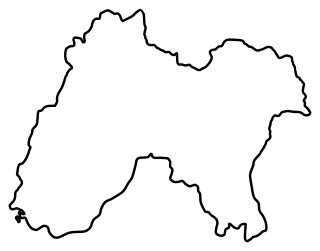
Elections to the Punjab Provincial Assembly were held in January 1946 as part of the 1946 Indian provincial elections.




















